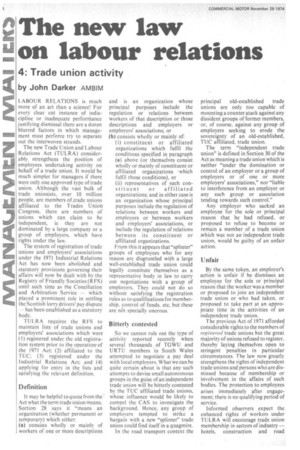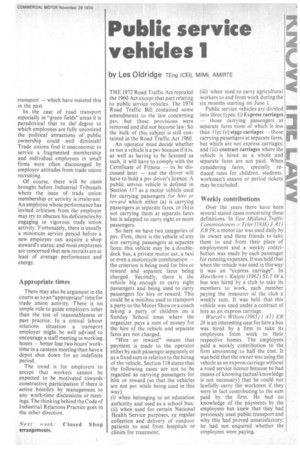The new law on labour relations
Page 46

Page 47

If you've noticed an error in this article please click here to report it so we can fix it.
4: Trade union activity
by John Darker AMBIM
LABOUR RELATIONS is much more of an art than a science! For every clear cut instance of indis cipline or inadequate perforniance justifying dismissal there are a dozen blurred factors in which management must perforce try to separate out the interwoven strands.
The new Trade Union and Labour Relations Act (TULRA) consider ably strengthens the position of employees undertaking activity on behalf of a trade union. It would be much simpler for managers if there were only one approved type of trade union. Although the vast bulk of trade unionists, over 10 million people, are members of,trade unions affiliated to the Trades Union Congress, there are numbers of unions which can claim to be independent, ie they are not dominated by a large company or a group of employers, which have rights under the law.
The system of registration of trade unions and employers' associations under the 1971 Industrial Relations Act has now been abolished and statutory provisions governing their affairs will now be dealt with by the Registry of Friendly Societies (RFS) until such time as the Conciliation and Arbitration Service — which played a prominent role in settling the Scottish lorry drivers' pay dispute — has been established as a statutory body.
TULRA requires the RFS to maintain lists of trade unions and employers' associations which were (1) registered under the old registration system prior to the operation-of the 1971 Act; (2) affiliated to the TUC; (3) registered under the Industrial Relations Act; and (4) applying for entry in the lists and satisfying the relevant definition.
Definition
It may be helpful to quote from the' Act what the term trade union means. Section 28 says it "means an organization (whether permanent or temporary) which either:
(a) consists wholly or mainly of workers of one or more descriptions
and is an organization whose principal purposes include the regulation or relations between workers of that description or those descriptions and employers or employers' associations; or
(b) consists wholly or mainly of: (i) constituent or affiliated organizations which fulfil the conditions specified in paragraph (a) above (or themselves consist wholly or mainly of constituent or affiliated organizations which fulfil those conditions), or
(ii) representatives of such con stituent or affiliated organizations; and in either case is an organization whose principal purposes include the regulation of relations between workers , and employers or between workers and employers' associations, or include the regulation of relations between its constituent or affiliated organizations.
From this it appears that "splinter" groups of employees who for any reason are disgruntled with a large well-established trade union could legally constitute themselves as a representative body in law to carry out negotiations with a group of employers. They could not do so without satisfying the registration rules as to qualifications for membership, control of funds, etc, but these are not specially onerous.
Bitterly contested
So we cannot rule out the type of activity reported recently when several thousands, of TGWU and URTU members in South Wales attempted to negotiate a pay deal with local employers. What we can be quite certain about is that any such attempts to devise small autonomous groups in the guise of an independent trade union will be bitterly contested by the TUC affiliated trade unions, whose influence would be likely to compel the CAS to investigate the background. Hence, any group of employers tempted to strike a bargain with a new "splinter" trade union could find itself in a quagmire.
In the road transport context the principal old-established trade unions are only too capable of mounting a counter atack against any dissident groups of former members, or, of course, against any group of employers seeking to erode the sovereignty of an old-established, TUC affiliated, trade union.
The term "independent trade union" is defined in Section 30 of the Act as meaning a trade union which is neither "under the domination or control of an employer or a group of employers or of one or more employers' associations," nor "liable to interference from an employer or any such group or association tending towards such control."
Any employer who sacked an employee for the sole or principal reason that he had refused, or proposed to refuse to become or remain a member of a trade union ,which was not an independent trade union, would be guilty of an unfair action.
Unfair
By the same token, an employer's action is unfair if he dismisses an employee for the sole or principal reason that the worker was a member or proposed to join an independent trade union or who had taken, or proposed to take part at an appropriate time in the activities of an independent trade union.
The previous Act of 1971 afforded considerable rights to the members of regivered trade unions but the great majority of unions refused to register, thereby laying themselves open to stringent penalties in particular circumstances. The law now greatly strengthens the rights of independent trade unions and persons who are dismissed because of membership or involvement in the affairs of such bodies. The protection to employees arises immediately after engagement; there is no qualifying period of service.
Informed observers expect the enhanced rights of workers under TULRA will encourage trade union membership in sectors of industry — hotels, construction and road transport — which have resisted this in the past.
In the case of road transport especially in "green fields" areas it is paradoxical that to the, degree to which employees are fully unionized the political attractions of public ownership could well diminish! Trade unions find it uneconomic to service a fragmented membership and individual employees in small firms were often discouraged by employer attitudes from trade union recruiting.
Of course, there will be cases brought before Industrial Tribunals where the issue of trade union membership or activity is irrelevant. An employee whose performance has invited criticism from the employer may try to obscure his deficiencies by engaging in vigorous trade union activity_ Fortunately, there is usually a minimum service period before a new employee can acquire a shop steward's status; and most employees are concerned that new recruits are at least of average performance and energy.
Appropriate times
There may also be argument in the courts as to an "appropriate" time for trade union activity. There is no simple rule to guide employers other than the test of reasonableness or past practice. In a critical labour relations situation a transport employer might be well advised to encourage a staff meeting in working hours — better lose two hours' worktime in a canteen meeting than have a depot shut down for an indefinite period.
The trend is for employers to accept that workers cannot be expected to be motivated towards . constructive participation if there is active hostility by management to any work-time discussions or meetings. The thinking behind theCode of Industrial Relations Practice goes in the other direction.
Next week: Closed Shop arrangements.




























































































